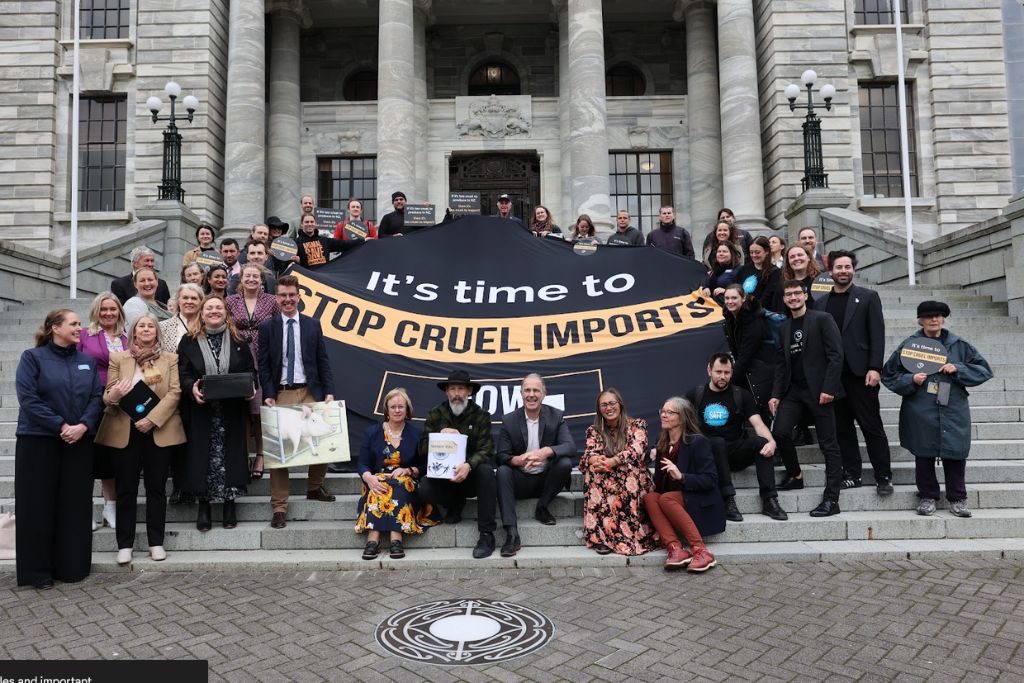Action Urged As New Bill And Petition Seek To Close Animal Imports Loophole

A new member's bill addressing the import of animal products was announced at Parliament today (6 May), alongside the delivery of a petition with over 11,000 signatures calling for imported animal products to meet local welfare standards. This powerful legislative proposal, backed by thousands of concerned citizens, creates momentum for change as New Zealand begins trade negotiations with India.
The petition, by animal law expert Associate Professor Marcelo Rodriguez Ferrere, was received by Labour MP Rachel Boyack, while Green MP Steve Abel announced the introduction of his bill, the Animal Products (Closing the Welfare Gap) Amendment Bill. National MP Grant McCallum alongside representatives from Animal Policy International, SPCA, SAFE, and farmer Walt Cavendish spoke at the event, providing diverse perspectives on the pressing need for reform.
The timing could not be more critical as yesterday New Zealand formally began trade negotiations with India — where over 90% of hens remain in battery cages, a practice banned in New Zealand — highlighting the urgent need to address this inconsistency.
Last year a report revealed that many animal products come from countries that allow practices like confinement of egg-laying hens in battery cages, pregnant pigs in sow stalls, and live lamb cutting (mulesing) of sheep - all banned in New Zealand due to welfare issues but still used by major trading partners.
During the event Labour animal welfare spokesperson Rachel Boyack emphasised the need for consistency in animal welfare standards: "The petitioner raises a fair point that there are products sold on New Zealand shelves that are made in countries with lower animal welfare standards than ours. I commend the petitioner on bringing this petition to Parliament and look forward to it making its way through the select committee process for thorough consideration. Consumer preferences are changing, and New Zealand customers rightly expect that all products in our market, regardless of origin, meet New Zealand’s animal welfare standards."
Steve Abel highlighted the ongoing issues with imports: "It has been years since New Zealand took the principled decision to ban sow stalls due to the immense suffering they cause to mother pigs. Yet, we continue to import significant quantities of cruel pork each year, contributing directly to animal suffering worldwide and undercutting more ethical local producers. My “closing the welfare gap” Bill will close this loophole. Every day we delay adds to the suffering of animals farmed overseas and sold in New Zealand, and disadvantages our local farmers."
In his address, Animal Policy International Co-Executive Director Rainer Kravets stressed the urgency: "As New Zealand negotiates new trade agreements, the amount of cruel imports may rise further. The time is now to require imports to meet our standards: creating certainty and ensuring our standards are not traded away with each trade deal. Not only is this possible, it’s the right thing to do - for animals, for our farmers and for New Zealanders who want truly better welfare for animals. The Government has a strong mandate to enact legislation with over 8o% of New Zealanders agreeing that imported products from outside New Zealand should respect the same animal welfare standards as those applied in New Zealand.”
This situation also creates a competitive disadvantage for New Zealand farmers who must comply with local laws, while effectively allowing practices rejected by New Zealand voters to continue entering through imports.
Walt Cavendish, a dairy farmer said, “The welfare gap is growing with many imports not up to the high standards that consumers demand of their Kiwi Farmers, farmers are not able to compete on a level playing field and the high animal welfare standards are ignored on many imported products. Farmers and consumers deserve better and so do our livestock. If better is possible, good is never enough."
Debra Ashton, CEO from SAFE said, “Whilst there are still many improvements to be made in New Zealand, it is hypocritical of us to be importing products from countries with lower welfare standards than our own. At the very least, our laws must extend also to imports. This is something both SAFE and farmers can agree on.”
“We know that New Zealanders care deeply about animal welfare, yet we continue to import products that are the result of cruelty that would be illegal here at home. Without swift action, imminent trade deals could further compromise New Zealand's values, standards and our global reputation. Animals deserve protection no matter where they are raised, and we urge the government to take action," said Arnja Dale, Chief Scientific Officer at the SPCA.
"For Aotearoa, addressing this issue isn't something for the future—it requires immediate attention to maintain our integrity in animal welfare," Marcelo Rodriguez Ferrere said. “We must act to close this welfare gap and stop cruel imports”.


 Gordon Campbell: On Why Leakers Are Essential To The Public Good
Gordon Campbell: On Why Leakers Are Essential To The Public Good The Tree Council: Auckland Council Notifies Plan Change 113 Notable Trees
The Tree Council: Auckland Council Notifies Plan Change 113 Notable Trees ACT New Zealand: ACT New Zealand Celebration Brunch - David Seymour's First Speech as Deputy PM
ACT New Zealand: ACT New Zealand Celebration Brunch - David Seymour's First Speech as Deputy PM NZ Police: Operation Purple | Anti-Social Road User Gathering In Levin
NZ Police: Operation Purple | Anti-Social Road User Gathering In Levin New Zealand Defence Force: The Latest Update On The HMNZS Manawanui Response
New Zealand Defence Force: The Latest Update On The HMNZS Manawanui Response NZCTU: NZCTU Release Detailed Budget 2025 Analysis
NZCTU: NZCTU Release Detailed Budget 2025 Analysis Department of Conservation: DOC Reveals Surprising Toilet Paper Stats
Department of Conservation: DOC Reveals Surprising Toilet Paper Stats


